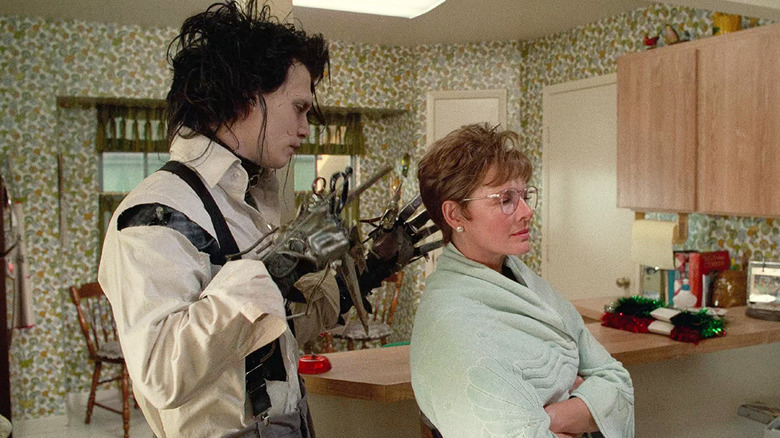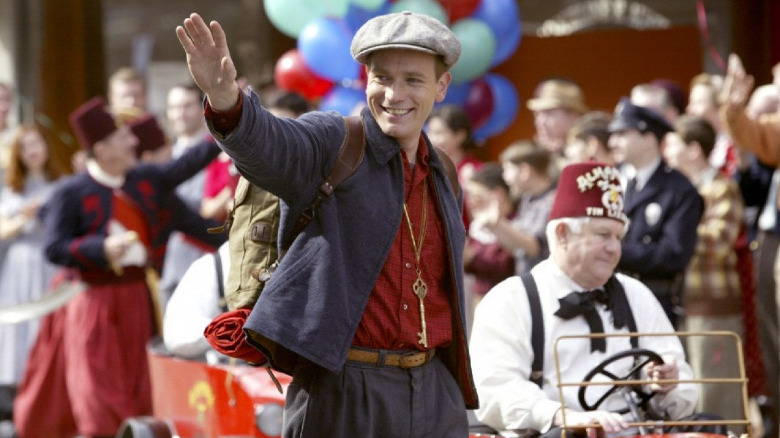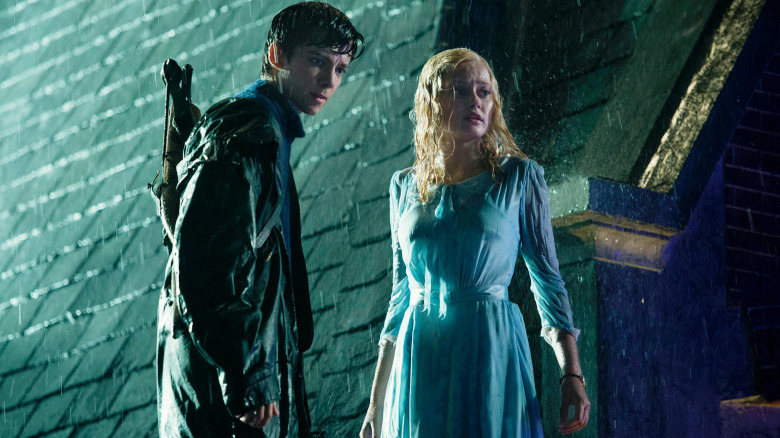Why There Are So Many Suburbs In Tim Burton's Movies
Morbidly peculiar things happen in the small U.S. towns and suburbs of director Tim Burton's films. A young boy resurrects his beloved deceased pup using the power of electricity in "Frankenweenie." A cosmetics saleswoman brings home a young man with giant scissors for hands to stay with her family in "Edward Scissorhands." Two good-natured ghosts invite a miscreant poltergeist to try to scare off their home's eccentric new owners in "Beetlejuice." But why is Burton so interested in exploring the weirdness lurking beneath the cheery facade of American society?
If you asked Burton, he might trace it back to his upbringing in Burbank, California. It was a place where he always felt like a misfit growing up, save for when he was hanging around the Valhalla Memorial Park Cemetery at the end of the street where he and his family lived. As he recalled to Entertainment Weekly in 2012:
"[The cemetery] didn't quite feel morbid, although people probably think it is. It felt more exciting and lonely and special and emotional. I guess it was a good place to think."
Although he had long since left that world behind, Burton argued that those "early seeds" that form who we become as adults "don't really leave you." Burton added, "You can't really just erase them and go, 'I'm moving on.' It's part of your DNA." When asked if he would go back and change anything about his gloomy childhood if he could, the filmmaker clarified:
"No. I felt quite miserable in a lot of ways and depressed. But no, I wouldn't [change that], because it's something that makes you who you are. I don't think I would change anything, really, even though if you asked me back then I would have changed every single thing."
The Weirdo Next Door
In an article written for Vox in 2019, Aja Romano noted that the idea of something malevolent or dangerous lurking around the corner of an otherwise pleasant neighborhood — like a cemetery down the street from your home — has manifested itself time and time again in Burton's movies as a director (or, in the case of "The Nightmare Before Christmas," a co-writer and producer). As Romano put it:
As a mature artist, Tim Burton's work married his love of the surreal to stories that stripped away the banality of everyday, politely civilized life. "Vincent" and "Frankenweenie" are about normal boys feeding their love for the grotesque within quiet normal households. "The Nightmare Before Christmas" is about the unholy juxtaposition of Halloween and Christmas. "Sweeney Todd" sees a serial killer opening up a respectable barber shop; though based on an existing musical, its themes fit perfectly into the Burton portfolio.
This idea extends to the protagonists in many of Burton's films. Be it Pee-wee Herman from "Pee-wee's Big Adventure," the titular movie director from "Ed Wood" or Ed Bloom from "Big Fish," Burton's leads are typically outsiders or "weirdos" who live in otherwise unremarkable places. Even in the rare cases when his film's heroes are popular among the locals, like the young Ed Bloom, they just don't blend in with the world around them. This is also why critics have long argued that the primary characters in Burton's movies, particularly those played by Johnny Depp, are really just on-screen avatars for the filmmaker. And for a long time, that approach served him well as a storyteller.
How Burton Lost His Way
For as personal as his movies used to be, at some point, Tim Burton's directorial efforts began to feel more like a brand than an oeuvre of films linked by their shared fascination with the macabre underbelly of so-called polite society. But where did he go off-course?
As someone who loved Burton's earlier movies when I was younger, I think the problem is that Burton, as a director, has struggled to evolve since the early 2000s. He's shown signs of developing as an artist in films like "Sweeney Todd," and "Big Eyes," yet for every step forward he takes, he takes one back and churns out a reboot ("Alice in Wonderland," "Dark Shadows") that sees him rehashing the same thematic and visual motifs without bringing anything fresh to the table. Even when he returned to the suburbs with 2012's stop-motion "Frankenweenie" or tried his hand at another coming of age parable with "Miss Peregrine's Home for Peculiar Children" in 2016, Burton mostly wound up retreading familiar ground to lesser returns.
That trend continued with his live-action "Dumbo" remake, the film's surprising criticism of corporate acquisitions aside. (For more on that, read Kayleigh Donaldson's 2019 piece for Screen Rant, "Dumbo Accidentally Shows Why The Fox/Disney Deal Is Bad.") As much as I hope that Burton stretches his wings further with his direction on the upcoming "Addams Family" reboot series "Wednesday," he just doesn't seem interested in rekindling his old spark or finding new things to say about the strange side of the suburbs at this stage. But I'd love to be proven wrong.


